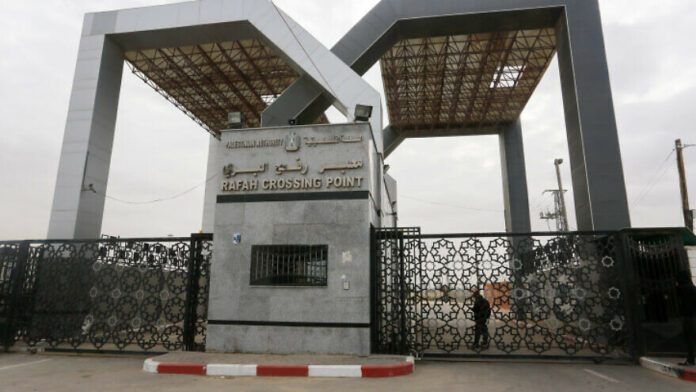Israeli Prime Minister Benjamin Netanyahu’s office issued a statement addressing recent claims about the Rafah Crossing, the critical border link between Gaza and Egypt. The statement partially denied a Saudi-owned media outlet’s report, which alleged that Israel had agreed to transfer control of the crossing to the Palestinian Authority (P.A.).
Denial of Saudi Report
According to the Prime Minister’s Office (PMO), reports that Mossad Director David Barnea and Shin Bet chief Ronen Bar had informed Egyptian General Intelligence head Maj. Gen. Hassan Rashad of Israel’s willingness to grant full control of the Rafah Crossing to the P.A. were inaccurate.
The PMO clarified that non-Hamas-affiliated Gazans currently manage the crossing under Israeli Security Agency oversight. These individuals also oversee essential civilian services in Gaza, including electricity, water, and sewage, since the onset of the Israel-Hamas war.
European Oversight at Rafah
The PMO added that the European Union Border Assistance Mission Rafah supervises the operation of the crossing. Israeli forces remain stationed around the area, ensuring no passage occurs without approval from the Israel Defense Forces (IDF) and the Israeli Security Agency.
The P.A.’s involvement, as of now, is limited to stamping passports in compliance with existing international arrangements. This procedure governs the movement of Gazans leaving the Strip to enter other countries.
Future Framework
The PMO emphasized that the current arrangement is a temporary measure under the first stage of the Israel-Hamas ceasefire. Discussions are ongoing to evaluate the framework’s sustainability as the ceasefire progresses.
Negotiations with Egypt
Israeli officials, including Barnea and Bar, recently met with Egyptian counterparts to address concerns regarding the next phases of the ceasefire. Discussions reportedly covered Israel’s commitment to reduce its military presence in the Philadelphi Corridor and withdraw from the Netzarim Corridor. The release of Palestinian terrorist prisoners scheduled for Saturday was also on the agenda.
Palestinian Authority and EU Collaboration
On Tuesday, Hussein al-Sheikh, a senior PLO official, met with Nataliya Apostolova, the E.U. observer mission head at Rafah Crossing, to discuss redeploying the monitoring mission. This move aims to prepare for the P.A.’s return to managing the Rafah and Kerem Shalom border crossings.
Egypt’s Role
After the IDF seized control of the Rafah Crossing in May, Egypt closed the border, citing concerns over Israeli presence. Egyptian President Abdel Fattah el-Sisi prevented aid trucks from entering Gaza, attributing the delay to Israel’s ongoing military operations.
Israel’s Long-term Vision
Prime Minister Netanyahu has reiterated his opposition to renewed Hamas or P.A. governance in Gaza. Instead, he advocates for local Gazan leadership not hostile to Israel, with potential support from countries like the UAE and Saudi Arabia. In a May 9 interview, Netanyahu expressed his vision of fostering stability and peace in the region through this approach.
Frequently Asked Questions
Who currently manages the Rafah Crossing?
The Rafah Crossing is managed by non-Hamas-affiliated Gazans under the oversight of the Israeli Security Agency, with supervision from the European Union Border Assistance Mission Rafah.
What is the role of the Palestinian Authority at the crossing?
The P.A.’s role is limited to stamping passports, enabling Gazans to travel internationally under existing agreements.
Is Israel reducing its military presence in the Gaza-Egypt border region?
Discussions are ongoing about reducing Israel’s military presence in areas like the Philadelphi Corridor as part of the ceasefire agreement.
What is Egypt’s position on the Rafah Crossing?
Egypt has taken a cautious approach, closing the crossing and restricting aid movement until Israel withdraws its forces from the border area.
Conclusion
Israel remains steadfast in its approach to managing the Rafah Crossing amid ongoing negotiations. While ensuring security and stability, Israel is exploring new governance frameworks for Gaza, emphasizing the involvement of local bodies that are not antagonistic toward the Jewish state. The situation highlights the complexities of regional diplomacy as stakeholders navigate the path toward peace.
